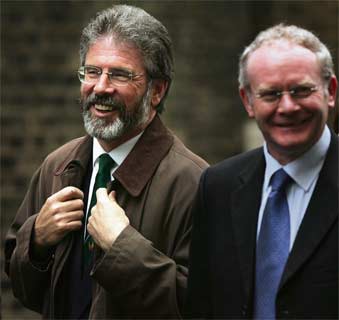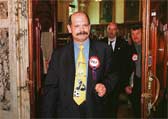The Trouble with Remembering
Susan McKay's new book, 'Bear In Mind These Dead', about victims from Northern Ireland's Troubles, their families and communities, is sensitive and comprehensive. Review by Martin Manseragh.
 Susan McKay is a writer and journalist of courage, integrity and humanity, who for many years worked in the community. She writes with good authority and without noticeable bias from her own family background in Derry. In the first part of this book, she relates many stories of the victims of the Troubles, including their surviving friends and families. The harrowing and detailed accounts are based on what in most cases must have been difficult and sensitive interviews, where people relived events that they would, in most cases, rather not speak about. Occasionally, as in the case of Billy Wright, the interviews were unpleasant and uncomfortable as well. In the second part of the book, she examines the inevitably inadequate, though well-intentioned, efforts of governmental agencies and others to help victims come to terms with losses likely to haunt them for the rest of their lives.
Susan McKay is a writer and journalist of courage, integrity and humanity, who for many years worked in the community. She writes with good authority and without noticeable bias from her own family background in Derry. In the first part of this book, she relates many stories of the victims of the Troubles, including their surviving friends and families. The harrowing and detailed accounts are based on what in most cases must have been difficult and sensitive interviews, where people relived events that they would, in most cases, rather not speak about. Occasionally, as in the case of Billy Wright, the interviews were unpleasant and uncomfortable as well. In the second part of the book, she examines the inevitably inadequate, though well-intentioned, efforts of governmental agencies and others to help victims come to terms with losses likely to haunt them for the rest of their lives.
Amidst more general and more abstract political, security-focused and sociological studies of the Troubles, it is salutary to have a vivid reminder of the sheer awfulness of the slaughter, regardless of the agency, paramilitary or State, that was involved, as experienced by those at the receiving end. Ensuring that the dead are not forgotten is done sensitively and objectively without any voyeurism or sensationalism. What is relatively unusual, apart from the invaluable complete sourcebook Lost Lives, is the comprehensive and unsparing focus that highlights victims from all categories without any hierarchy.
 Very often, tragedy was compounded by calumny of the victims, or by the further targeting of a family. The retrospective justifications for the killing campaigns related in this book come across as hollow. The need for truth and for justice is unlikely to be satisfied in most cases, unfortunately, as most of the protagonists have little interest in fully revealing their roles or actions. The British authorities have not cooperated in uncovering collusion, or the extent to which it may have been a systematic covert policy, despite any honourable and conscientious investigating officers they themselves have appointed. There is a steadfast refusal to open up “appalling vistas”. Too few Loyalists seem to feel “the abject and true remorse” expressed by Gusty Spence on 13 October 1994 at the time of the Loyalist ceasefire, and too few have the regrets and thoughtful reflections of David Ervine or David Adams. The Sinn Féin leadership still glorifies the struggle, and honours those who carried out the most grievous deeds, even if they do not stand over everything done by the IRA. The conditions do not begin to exist for a South African-type Truth Commission, which probably only had mixed results anyway. Underlying the violence in the North was a hatred that still festers away today, but gradually is decreasing, one hopes. Through much of the book runs a palpable anger at the way in which life was wantonly taken away, whether in retaliation, because someone worked in an army base, or because they were Catholics or mistaken for such.
Very often, tragedy was compounded by calumny of the victims, or by the further targeting of a family. The retrospective justifications for the killing campaigns related in this book come across as hollow. The need for truth and for justice is unlikely to be satisfied in most cases, unfortunately, as most of the protagonists have little interest in fully revealing their roles or actions. The British authorities have not cooperated in uncovering collusion, or the extent to which it may have been a systematic covert policy, despite any honourable and conscientious investigating officers they themselves have appointed. There is a steadfast refusal to open up “appalling vistas”. Too few Loyalists seem to feel “the abject and true remorse” expressed by Gusty Spence on 13 October 1994 at the time of the Loyalist ceasefire, and too few have the regrets and thoughtful reflections of David Ervine or David Adams. The Sinn Féin leadership still glorifies the struggle, and honours those who carried out the most grievous deeds, even if they do not stand over everything done by the IRA. The conditions do not begin to exist for a South African-type Truth Commission, which probably only had mixed results anyway. Underlying the violence in the North was a hatred that still festers away today, but gradually is decreasing, one hopes. Through much of the book runs a palpable anger at the way in which life was wantonly taken away, whether in retaliation, because someone worked in an army base, or because they were Catholics or mistaken for such.
 It is a paradox of the peace process, which alienates some, though not all, of those who suffered directly during the Troubles, that it requires the principal protagonists to assume responsibility for extracting the community from a dreadful past, which in many cases they helped to prolong. However difficult it may be, families still have lives to live. As the wife of Eamon Collins, who was savagely murdered near Newry for turning against the Provos, told the writer: “You shouldn't live in death.” There were, unfortunately, many deaths where little zeal was shown in trying to catch the culprits. The least malign explanation and the least attribution of responsibility were sought out to avoid destabilising the peace process by authorising plausible and probable but unproven hypotheses. Of course, no organisation can be responsible for the actions of individuals, which are disowned, and realistically a clean cut can be announced in principle but takes time to become universally observed. While most people are profoundly grateful to live in more peaceful times, and Ireland now figures in the Global Peace Index as one of the world's five most peaceful countries, the cost of arriving to this point should not be forgotten. The need to remember becomes all the more poignant, considering the number of small militant organisations who have seemingly learnt nothing from the failures and tragedies of 30 years of conflict.
It is a paradox of the peace process, which alienates some, though not all, of those who suffered directly during the Troubles, that it requires the principal protagonists to assume responsibility for extracting the community from a dreadful past, which in many cases they helped to prolong. However difficult it may be, families still have lives to live. As the wife of Eamon Collins, who was savagely murdered near Newry for turning against the Provos, told the writer: “You shouldn't live in death.” There were, unfortunately, many deaths where little zeal was shown in trying to catch the culprits. The least malign explanation and the least attribution of responsibility were sought out to avoid destabilising the peace process by authorising plausible and probable but unproven hypotheses. Of course, no organisation can be responsible for the actions of individuals, which are disowned, and realistically a clean cut can be announced in principle but takes time to become universally observed. While most people are profoundly grateful to live in more peaceful times, and Ireland now figures in the Global Peace Index as one of the world's five most peaceful countries, the cost of arriving to this point should not be forgotten. The need to remember becomes all the more poignant, considering the number of small militant organisations who have seemingly learnt nothing from the failures and tragedies of 30 years of conflict.
Bear in Mind These Dead is not an easy or comfortable read, and is not meant to be. It is sobering realism that, when understood properly, reinforces a peace without illusions. Susan McKay has produced another fine book of lasting value, even if it contains no ready answers to the problems posed. Those charged by government with finding such answers face-to-face with a difficult and painful legacy have an unenviable task, though it would be wrong to suggest that previous initiatives, such as the search for the disappeared, have not helped at least to some degree.
